Insights / Articles
European Congress on Rare Diseases (ECRD) 2020 in 60 seconds
Written by Gavin Jones on Monday, May 18, 2020
This was my first fully virtual congress and it must go down as a success – a fantastic well done to the teams at EURORDIS and ORPHANET who turned this around in a matter of weeks. I will attempt to briefly summarise two days of congress within the six different streams. This brevity will inevitably mean I miss things but hope this provides a flavour of this multi-stakeholder collaboration across the rare disease community.
One of the key reasons I attend this particular congress is it effectively drags me out of my industry bubble to better understand the viewpoints of patient groups, health systems and payers. There are always some impactful statements and I start and finish this piece with thoughts from the patient advocacy community:
Rebecca Skarberg, Oslo University, gave a strong message and described the patient voice as a growling roar which I thought was a brilliant description of the community’s potential strength of voice and how it needs to cohesively come together to drive change and better outcomes.
Core Congress Theme
Rare Foresight 2030
This major initiative was woven through the whole of the congress. Its foundation is based on different models to achieve better access to care and innovation for rare disease patients. There is a link to a short video that very effectively explains the initiative and the various scenarios: https://www.youtube.com/watch?v=WBvsj9E0U-g
I am interested to consider how industry, and its commercial model, can fit into these scenarios and play its part in leading to faster and more equitable access.
Congress Workstreams
I have attempted to summarise two days of discussion and debate, across six themes, into a couple of lines so bear with me! I have included drawings created by an artist as the congress progressed to help illustrate the themes – thank you to the congress organisers for creating these.
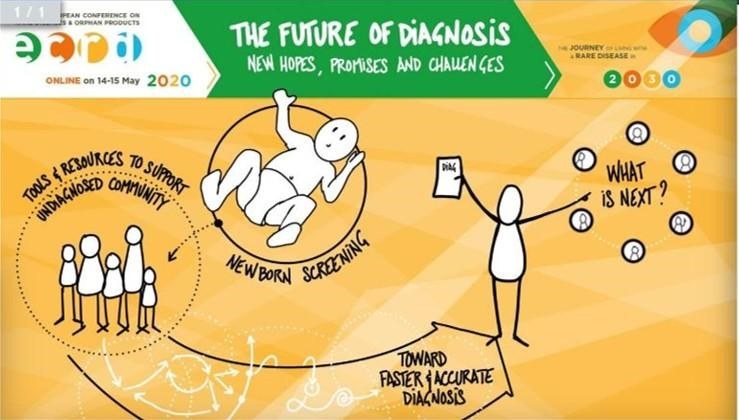
Theme 1 take home messages:
- Improve triage from primary care through more education
- Deliver equity of access to genomics services
- Lobby to reduce variability in new-born screening services
- Better understand the patient journey
- Need for better public and private collaborations
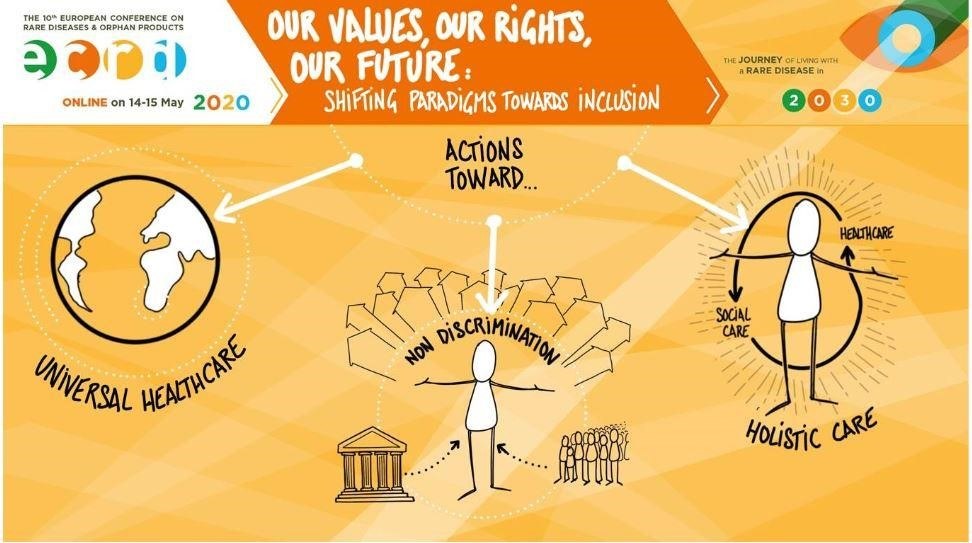
Theme 2 take home messages:
- Treating to limitations needs to stop
- Refocus on access to rights not just resources
- Drive equality through ERN (European Research Networks) education
- Integration of ERNs into specialised care
- Must change dynamic where risks are distributed collectively whilst profits individually
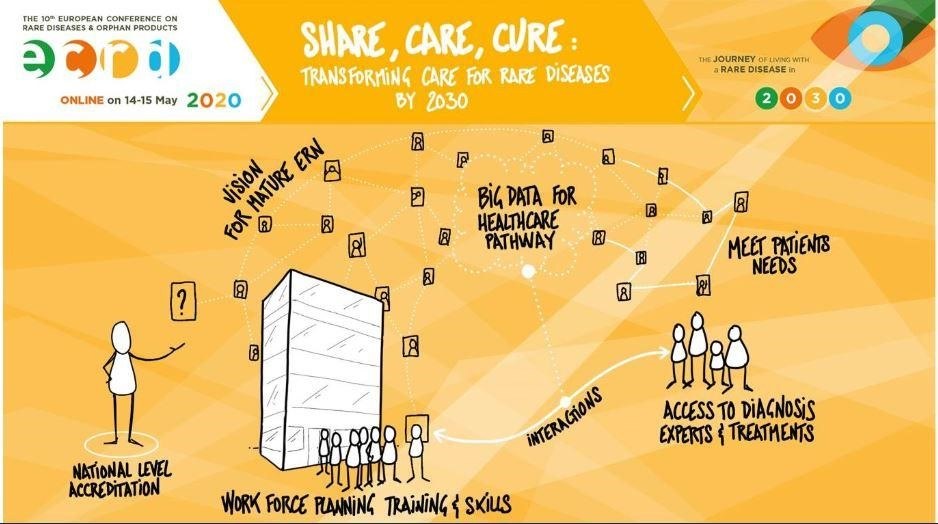
Theme 3 take home messages:
- Work towards ‘mature’ ERNs
- Go beyond patient centric care to community driven policy
- Greater solidarity across European countries
- Revision of EU and National rare disease policies
- New needs for ageing rare disease population
- Optimisation of big data for healthcare pathway improvement
- Develop digital pathways to increase capacity and empower patients
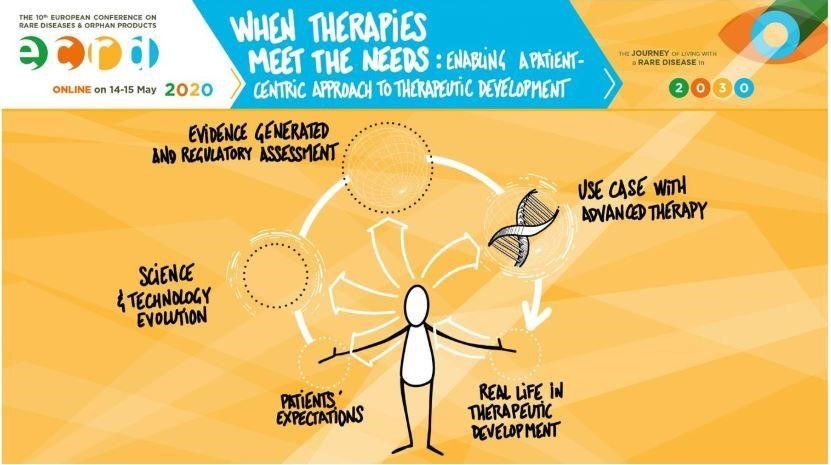
Theme 4 take homes messages:
- Patient exclusion comes from-
- Lack of disease focus/investment/innovations/treatments
- Access to clinical trials
- No reimbursement
- Patient inclusion can be facilitated by enabling patients to-
- Own their own data
- Be fully involved in research design
- Integrate RWE (Real World Evidence) data with clinical data
- Have a better understanding of pathway and value of medicines
- Sharing risk for collective benefit
- Utilise the ERNS to collect data, included QOL (Quality of Life) measures and enable patient ownership
- Recognise the interdependence of the whole rare disease community
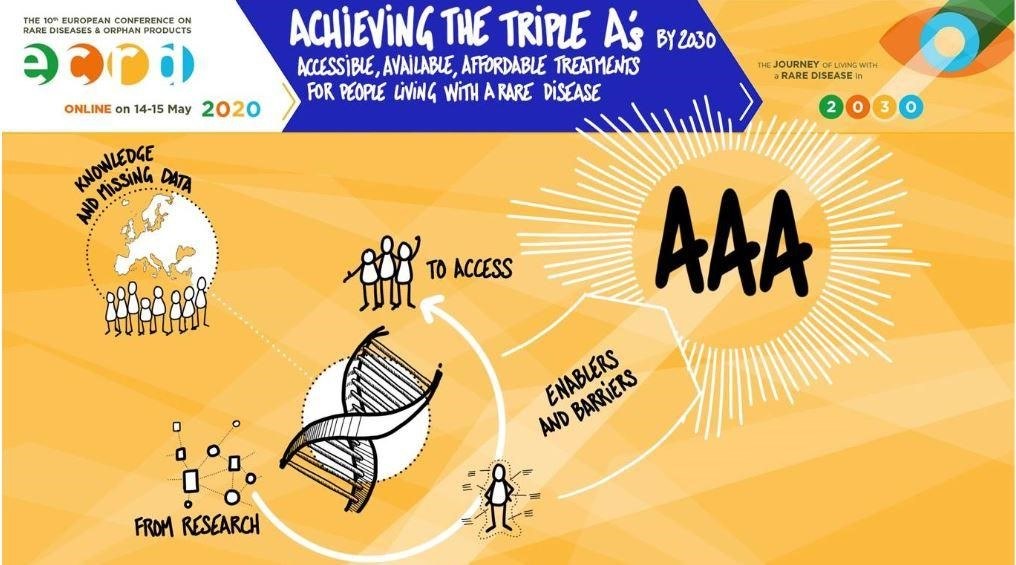
Theme 5 take home messages:
- ORPHANET survey has highlighted clear disparity of access
- Importance of recognising societal costs to demonstrate value
- Long term economic impact of COVID-19 crisis on access the new innovation
- Increasing pressure of advanced therapy costs on short term budgets
- Need for greater societal understanding of value of these treatments
- Clear gap between regulatory and HTA (Health technology Assessment) bodies
- Utilise more RWE and registry data to help fill the gaps
- How do we collectively move away from the ‘faster over fair’ model of access?
- Cross border directives required to facilitate advanced therapy access
- Collectively build trust in collaboration
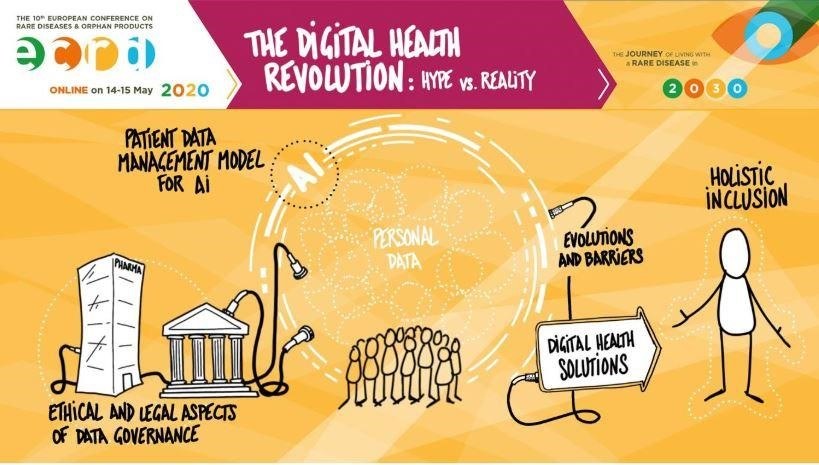
Theme 6 take home messages:
- The digital ‘revolution’ – hype versus reality
- Significant role of patients in harnessing the power of health data
- National implementation versus community base evolution
- PAGs (patient advocacy groups) must advocate for virtual solution
- Build trust in solutions – privacy, security, data utilisation
- Create standards to create equality in the above
- Already great examples of ‘hope through technology’
So a productive and useful congress in the virtual world we currently live in. There were a few technical issues (we will always be at the mercy of individual broadband speeds) but very well organised and run by a committed team. The opportunities to network were a bit limited and grabbing an informal coffee with people was sorely missed.
Finally closing on another message from the patient community. Jana Popova, European Patient’s Forum, described how patients have so much to offer and have the right and duty to contribute. I challenge myself, the teams at OPEN Health, our clients and other agencies to play their part in enabling this to be the ‘new normal’.
CAN WE HELP?
For information about OPEN Health’s services and how we could support you, please get in touch.
JOIN US
Visit our careers page to view opportunities at OPEN Health.